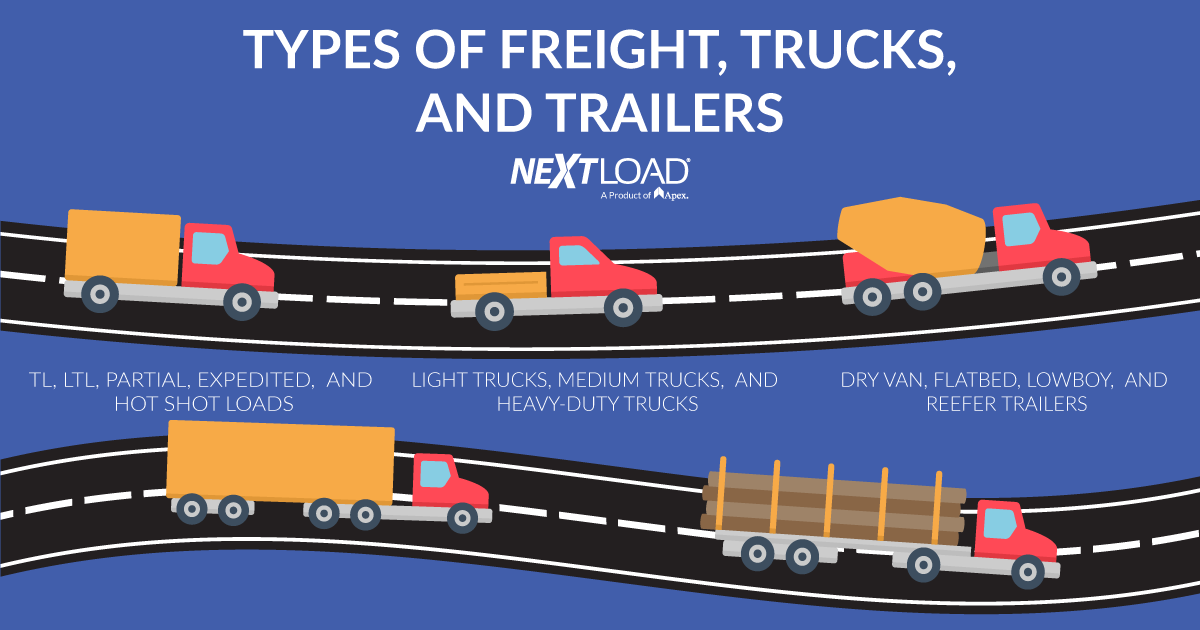How Different Freight, Trucks and Trailers Get the Job Done
There are so many different types of trucks on the road. Some equipment might look the same, but they often differ in the types of loads they transport. Knowing exactly what is being hauled can be hard to tell.
But one thing is for sure: In the trucking industry, there are many types of trucks and loads to get the job done. There are also different types of trailers for specific types of freight. Let’s break down freight, trucks, and trailers and hit the highlights.
Types of Truck Freight
Truck loads can vary just as much as the vehicles used to haul them. Let’s look at a variety of truck freight, or truck loads.
- TL (Truck Load) – Think full truck, so greater than 8,000 pounds and requires a large space such as the full trailer of an 18-wheeler.
- LTL (Less Than Truck Load) – A relatively small load, and consequently the least expensive and most popular freight transportation method.
- Partial Truck Load – Call this a medium-size truck load, which is usually booked by volume.
- Expedited or Hot Shot Load – These are typically smaller loads that need to get to their destinations fast. Expedited and hot shot trucking companies usually haul with smaller trucks.
Types of Trucks to Haul Loads
Trucks are divided into eight classes that range from lightest and smallest to heaviest and largest. Let’s take a quick look at trucks as grouped into light, medium, and heavy sizes.
- Light trucks – Classes 1-3 are usually non-commercial vehicles, such as minivans, SUVs, pickup trucks, etc.
- Medium trucks – Classes 4-6 are commercial trucks with weights ranging from 14,000 to 26,000 pounds. These would be box trucks, delivery trucks, school buses, F-450 super duty pickup, large walk-in trucks, and more.
- Heavy-duty trucks – Classes 7-8 are the big rigs with weights that could exceed 33,000 pounds. So, we’re talking garbage trucks, cement trucks, and huge 18-wheelers (Peterbilts, Kenworths, and Freightliners), to name a few.
Types of Trailers
When you haul loads, you need a trailer. That trailer is a part of your truck, naturally, and dictates what you can and cannot transport. There are many types of trailers, but let’s zoom in on four common ones.
- Dry van trailers – A dry van is an enclosed trailer, which is the most common freight container. Dry vans weigh 42,000 to 45,000 pounds and are used to transport a variety of goods that need to be sheltered from the elements such as non-perishable foods, clothing, and other merchandise.
- Flatbed trailers – Flatbed trailers, as the name implies, are like a flat bed for usually heavy equipment that can be transported open air. Think automobiles, tractors, machinery, construction materials, etc.
- Lowboy trailers – Lowboys are designed to carry massive weights, such as bulldozers and industrial equipment, with a deck that sits close to the ground. Lowboy trailers can weigh as much as 80,000 depending on how many axles are used.
- Reefer trailers – We talked about dry van trailers above. Reefer trailers are basically a dry van trailer with temperature control – a refrigerator on wheels, so to speak. So, reefer trailers are perfect to transport food that needs to stay cold (ice cream, milk, frozen dinners) or medications that must be kept refrigerated.
FIND GREAT LOADS FOR YOUR PREFERRED EQUIPMENT: Use NextLOAD.com, the FREE load board from Apex Capital, to search by equipment type (trailer, length, width, even specific key words) and find great loads tailored for your vehicle.
Are you not a NextLOAD user yet? You can find money-making loads for FREE in our comprehensive load board. Search by type of freight, type of truck, type of trailer, and more. Create a NextLOAD account now and find yourself a lucrative load to haul. Start here!

